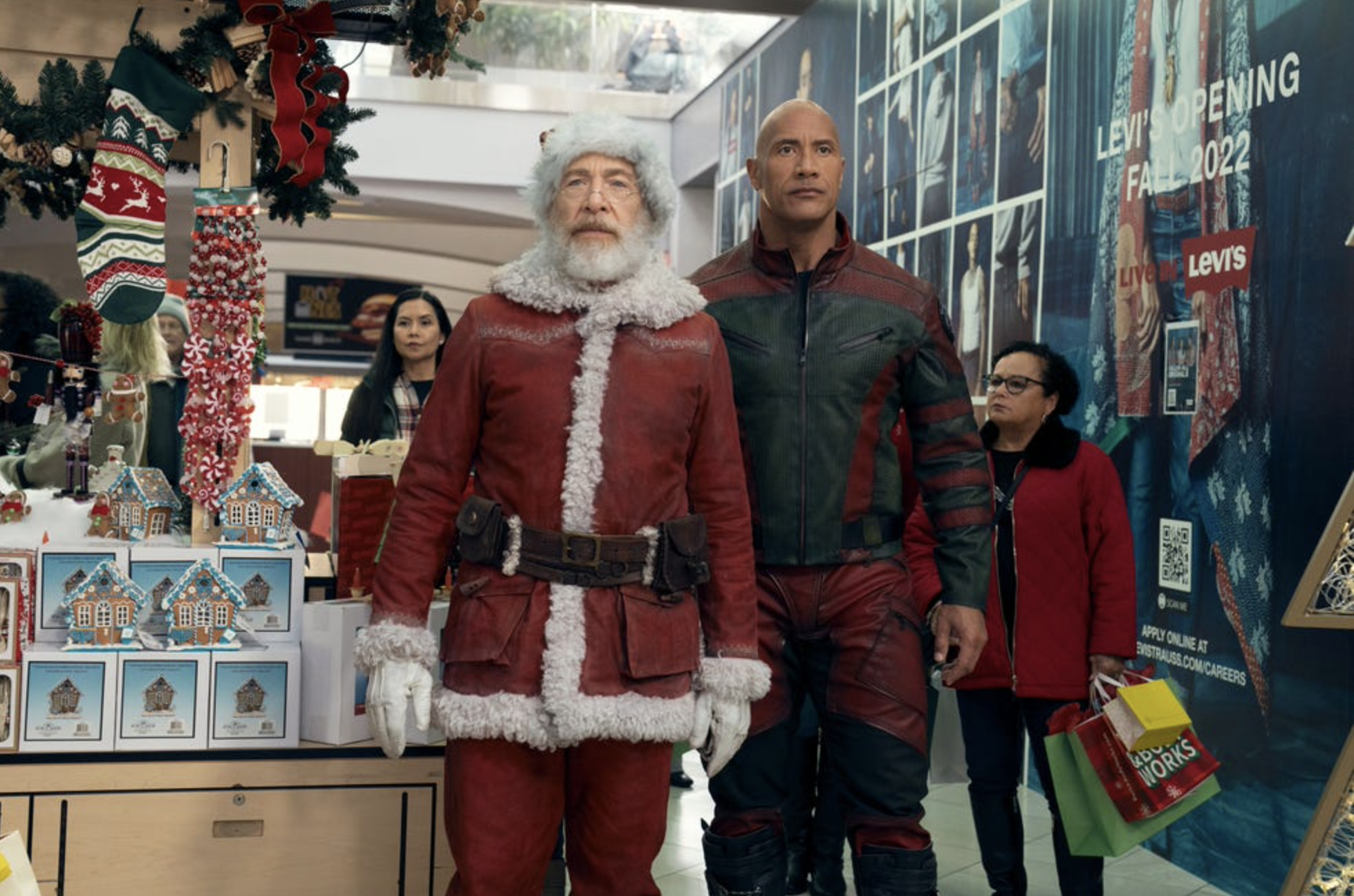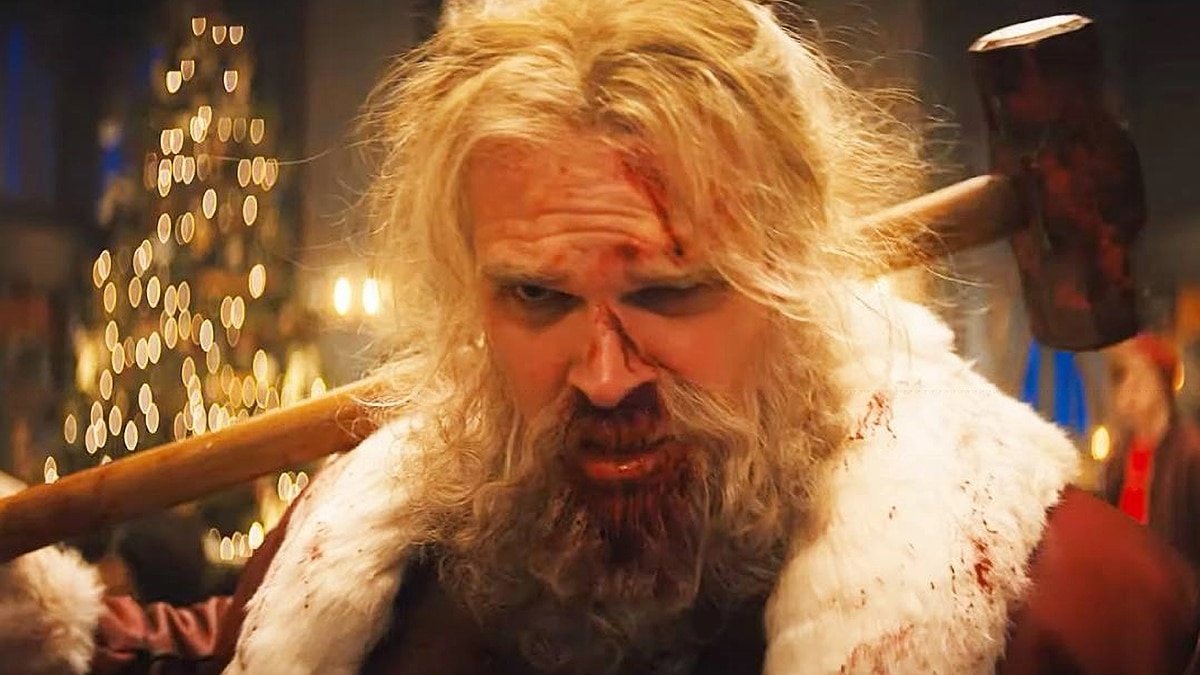RED ONE
Directing: C-
Acting: C+
Writing: D-
Cinematography: C-
Editing: D
Special Effects: C
Let’s talk, for just a moment, about Mariah Carey. I am not a fan. Okay, in the hands of the right director she can be a pretty good actor—but I’m talking about her music. And yes, I know, she has legions of fans; even I can acknowledge that she holds the record number of #1 singles of any solo artist in history. That doesn’t make the music good. I’m sorry, I just can’t with her music—especially that crazy-making perennial single “All I Want for Christmas Is You.” And I love Christmas!
You may be starting to see where I am going with this. Director Jake Kasdan (Jumanji: Welcome to the Jungle), perhaps, thought he was being a bit cheeky when, instead of throwing “All I Want for Christmas Is You” onto the soundtrack to his new, absolutely soulless Christmas movie, Red One, he chose “Santa Claus Is Coming’ to Town”—from the same 1994 album.
The song’s arrangement is as generic and forgettable as it could possibly be. It’s what plays over the end credits, standard white text on a black background, nothing fancy or cute. And this is easily the best part of the movie.
Red One is what happens when feeling dead inside becomes a feature film. I have never seen a movie with so much magic onscreen be so lacking in actual movie magic. I went into this thinking I was fully prepared, but ready to have a good time in spite of the poor reviews and lackluster response. Sometimes bad movies are fun! If only. Instead, Red One is so busy just being busy, it dulls the senses, and becomes a snooze fest. Believe me when I say that literally. I nodded off multiple times. During the periods I managed to stay awake, one of the five other people in the theater let out a loud snore. We’re all in this together, I guess.
Except: you aren’t. Or you won’t be, if you value your time. Some of you might expect amusement from a movie where someone actually utters the line, “It’s Christmas, dickhead!” Some of you might even be genuinely amused by it. In that case, you’ve lost my respect. I’m just over here wondering why the hell anyone would cast J.K. Simmons as a Santa Claus who is not fat, but jacked. Santa literally lifts weights in this movie. In what universe does this make sense? Santa is supposed to be cuddly and soft. Stop fat shaming Santa Claus!
Okay, okay. I was reminded, as I left the theater expressing my active contempt for this movie, that I did laugh a few times. We all have our moments of weakness. There are some things in Red One that are almost fun. There’s a testy polar bear, voiced by Reinaldo Faberlle, who might have improved the film slightly had he just gotten more screen time. Kristofer Hivju chews up the scenery pretty well as Krampus. This is about as close as I can get to finding redeeming qualities.
Chris Evans plays Jack O’Malley, the unscrupulous tracker tasked with finding Santa Claus after he is abducted. He’s a douchebag on the surface who we know from the first second will eventually be revealed to have a heart of gold, and Evans might as well be sleepwalking his performance. Dwayne Johnson plays Callum Drift, head of North Pole security, and the earnest seriousness of his performance would feel out of place if not for the fact that not one of these actors seems to think they are in the same movie as any of the others. Lucy Liu is utterly wasted as “Director Zoe Harlow,” just walking around looking mildly annoyed all the time. I would be too if I had to appear in this movie. Bonnie Hunt appears as Mrs. Claus and similarly gets nothing interesting to do. Kieran Shipka, once young Sally Draper from Mad Men now grown up, plays Gryla the Christmas Witch, attempting to ham it up as a villain but sadly failing to make any real mark.
Christmas movies are a dime a dozen anymore. Less than that, even. A penny per hundred. It used to be a fairly regular thing to get a theatrical Christmas movie release that actually penetrates and becomes something special. I felt something close to that with Happiest Season, but that was largely contextual: an effectively sweet holiday film released on a streamer (Hulu) during the pandemic. These are the kinds of things Red One isn’t even aiming for. It’ll entertain a few teenagers who get a kick out of a “Christmas movie” with enough profanity to land it a PG-13 rating.
There’s something about Red One that feels deeply cynical to me. It hits obligatory story beats and the same old moral lessons, purporting to be about “the meaning of Christmas” without actually using the phrase. Characters spew platitudes and learn to be “nicer,” driving home the consumerism of the holiday by using toy store stock rooms as portals to travel around the globe, packaged as entertainment for an audience that increasingly celebrates cruelty. It’s clear that no one involved in the making of this movie thought they were making something any more special than a paycheck, and as long as those checks cash, what reason do they have to care that this was easily the worst movie I’ve seen all year?
Why so serious? Jesus Christ, eat a doughnut!
Overall: D+


